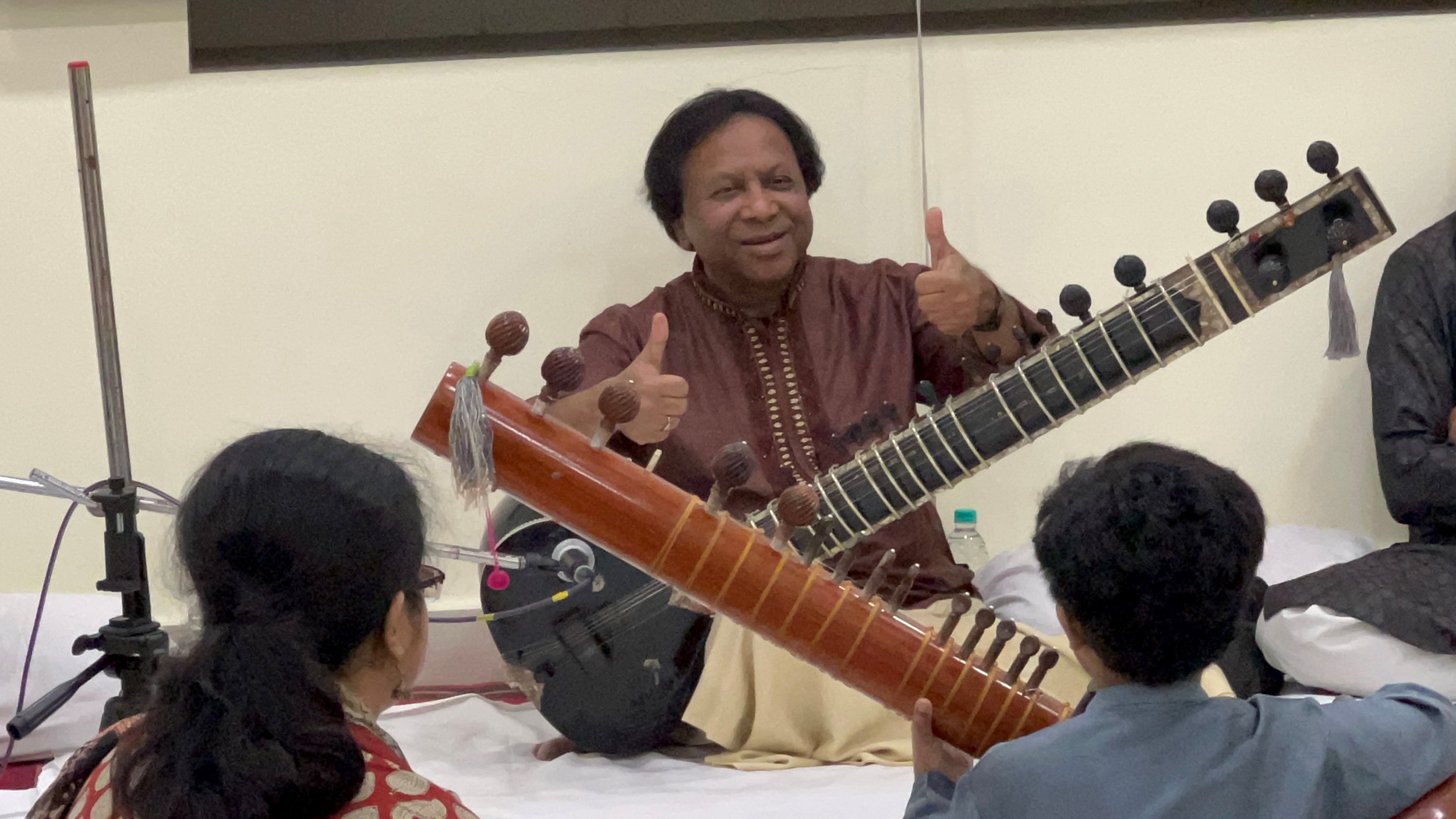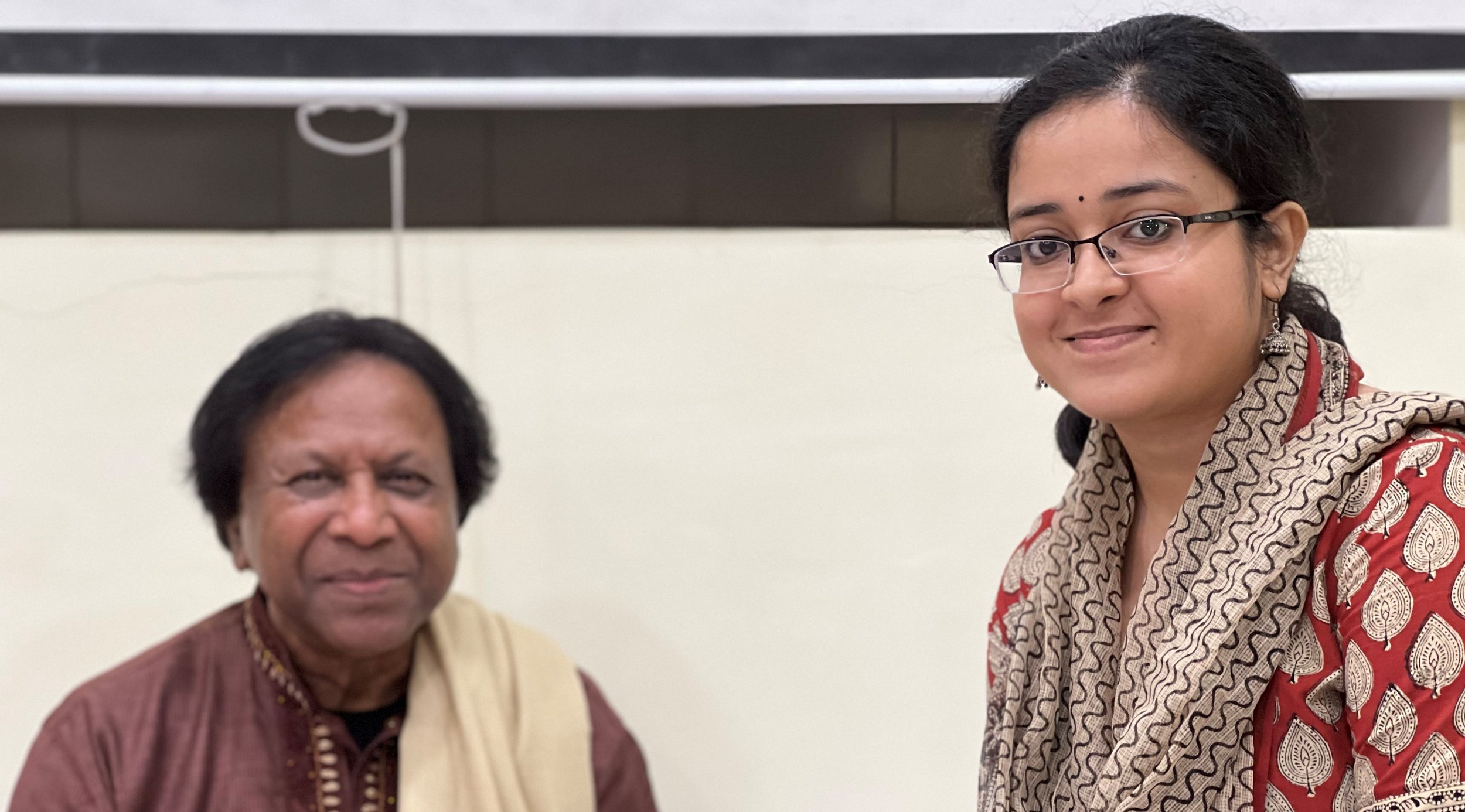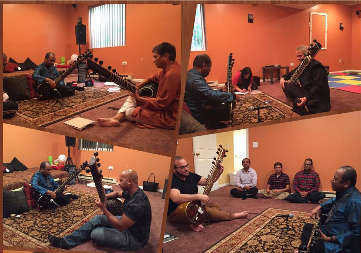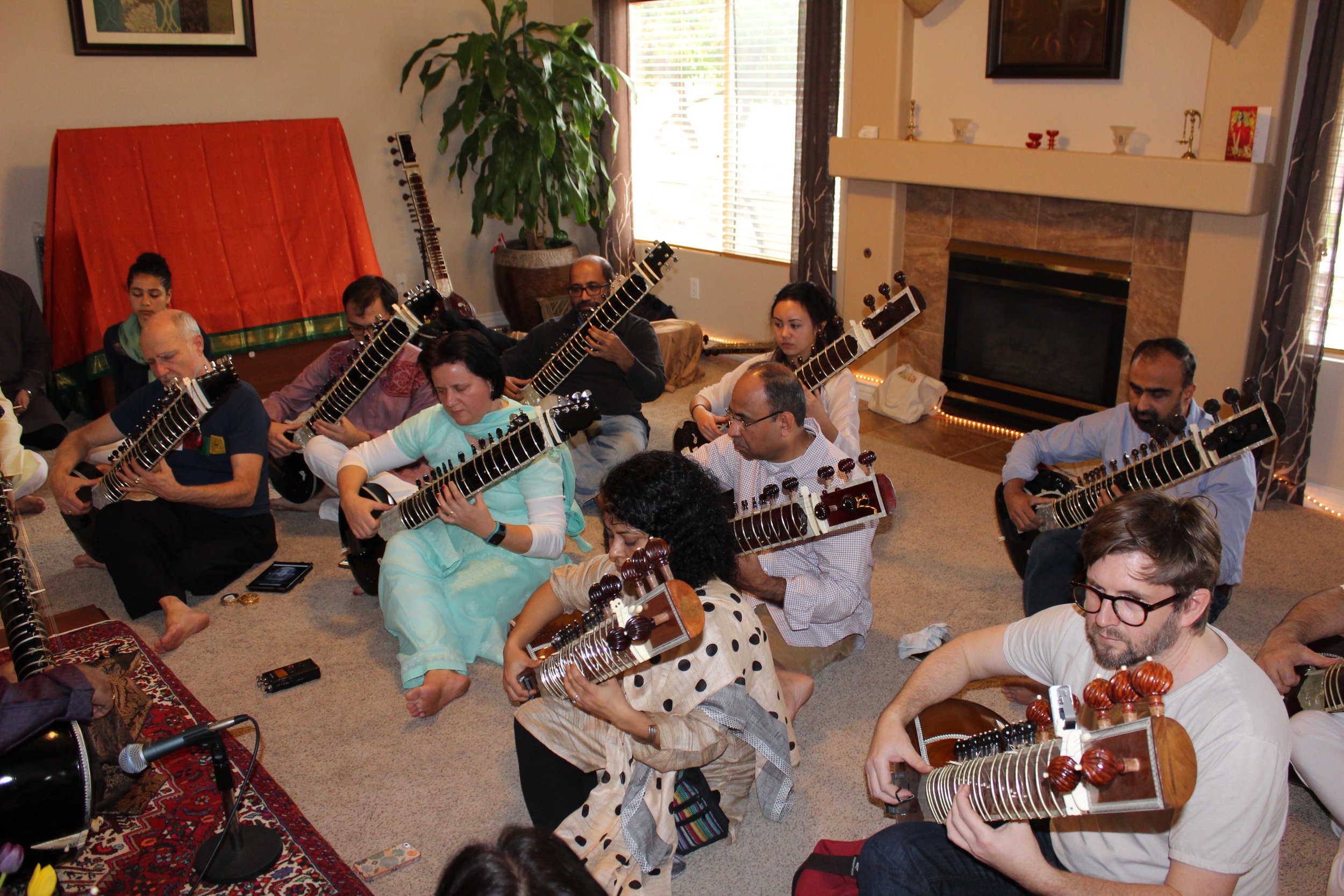Running around at shibirs one often overhears bits and pieces of interesting conversation. This time around (the January Chaiyanat – Kamod shibir) SPK tried to corral some of this conversational energy by asking a group of students to discuss what they understood to be the differences and similarities between Indian and Western Classical music.
The result was a very spirited 40-minute discussion full of different points of view and, I think, a lot of insight.
During the conversation, many of the participants prefaced their remarks with “I am not an expert, but…” and it was in a spirit of humility and mutual respect that things went down.
In what follows you will find a unique opportunity to listen in on a group of sitar players seeking better to understand their place in the delightfully multifaceted world in which all of us live and play.
Having gathered the group together after our morning session on Sunday, I asked the participants how they defined “classical” in the most general sense. Sudhir was quick to point out that the word “classical” was a western translation, and that there was no equivalent in Sanskrit or Hindi. He proposed “shastri” – a word relating to scholarship and ancient texts – as the closest thing. From there the discussion moved directly to comparisons. Thomas, a trained cellist, put forth “periodization” in Western classical music as a major difference. And although the group granted that there are no equivalents to “Baroque,” “Classical,” “Romantic,” or “Modern” in Indian music, the music nonetheless develops - as do the instruments.
Avichal then said boldly of Western Classical, “It’s all about harmony. It’s chordal.” Taking up on this idea, Jawwad noted that scales worked differently in Indian and Western music. The microtones (shrutis) that help define a raag, would not work in the counterpoint and harmony of the West. “The Western scale has to be mathematically precise for harmony, while the “re” (minor second) of Todi is not the same as the “re” of Shree.”
At this juncture, Thomas observed that Western classical music seldom departs from the written score. He also reminded everyone how western musicians seek to recreate the sound of the period in which a piece was originally composed – often using instruments constructed how they were in that earlier age. This important observation made me think, “In the West, the past is the past and must be conjured while in India the past remains in nearly every way part of the present.” Once, again this idea was “moderated” with Sudhir observing that even raag and Indian classical instruments are always changing. Is it a matter of degree?
Enter Sanjeev with his calm, considered tone: “I can define classical… what is timeless and what survives, and what people remember and cling to – that is classical.” Jay then emphasized the quality of work and originality saying, “Mozart produced things that were not there, Hayden did the same.” Sanjeev defended his point: “No matter if it is good, if it is forgotten and buried, it is not classical.” Jay answered, “I see what you’re saying, but I think classical is the FORM… ragas have rules, maybe that’s why Westerners associate it with classical music.” Good points all!
Pt. Ravi Shankar and Yehudi Menuhin - courtesy of The News Minute
In response to Jay, Kristopher spoke up for the first time, bringing in yet another important aspect of the “classical”: “It has not so much to do with the music, but [depends] on the class of people upon which the music is being played and who are listening to it.” Kristopher then mentioned African tradition as an example of the importance of community and audience in defining their particular “classicism”.
At this point, Avichal pulled the ideas together saying, “These are all elements that make up a part of it [the classical]. None of them by itself will define it.” This point was welcomed by all involved.
The conversation moved onto the idea of “universalism” in classical art forms. Jawwad presented the possibility that thinking the structures of any classical music are somehow “universal” is putting the cart before the horse. It is wide dissemination and accessibility that make up this aspect of music: “It’s just that Western music is in everywhere, it’s in the movies, in the cartoons (sic).” As for Indian classical, it was “a post-Independence export” helping make the case that “the West has science, India has culture.” Avichal then contended that before independence Indian classical music was virtually unknown – even in India – being mainly the music of the royal courts.
At this point, I mentioned something Ustadji had said over two decades ago and that I have never forgotten, namely that he had known of many classically trained Western musicians who had given it up and committed themselves fully to Indian music but did not know of a single example in the other direction. After asking why people thought this might be, Anna answered in a soulful and very personal way: “I heard Mozart every day in the cradle. Ok. This is music, but in India, it is more than that – it is very deep; it goes up to the root…. The difference between Indian classical music and Western is that it is deeper, it is spiritual… When I heard the sitar for the first time, finished, that’s it! Not interested in Western Classical music – at all.” Anna’s frankness was much appreciated and certainly spoke to the group’s “bias,” but as was characteristic of the discussion as whole voices came in to balance things out.
JJ mentioned musicians in the Western classical tradition may well have the same “convictions” about their music if you asked them (thereby inadvertently bringing up possible future panel discussions involving Western musicians!).
In direct response to my question as to why so few Indian musicians “move West” Jawwad commented, “In the West, there is a certain freedom to make your choices, there is a freedom from others which is not there in more traditional cultures.” Sudhir concurred and said, “It’s the same thing [in India and the West], it’s not like Indian music is more exalted.” JJ commented how Anna’s (and I suppose all our) “perceptions had changed” since learning sitar.
Anna then defended her position admirably saying, “If I go to Europe, I prefer to buy bread where there are seven generations of
bakers. Not because that bread is different.
It has something in it that was passed down from one generation to generation and it will always be tastier than any other bread that I eat.”
Things wound down, but many left the music room still talking about issues raised. It is my hope that these ideas will inspire all of you to think more deeply about the fantastic music we are learning and, perhaps, to share some of your ideas in response on our blog.
Thank you to all who participated. Wonderful…

















